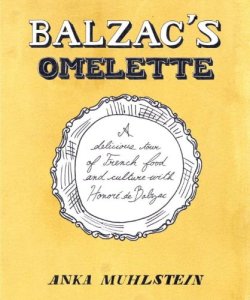Book Review: “Balzac’s Omelette” by Anka Muhlstein
by Jan
 Anka Muhlstein is a travel writer among other things, so she has a gift for description. In this book she takes on Balzac’s characters and their attitudes to food and eating. As well as Balzac’s own relationship with food.
Anka Muhlstein is a travel writer among other things, so she has a gift for description. In this book she takes on Balzac’s characters and their attitudes to food and eating. As well as Balzac’s own relationship with food.
It appears that he can waver from asceticism to gluttony in 24 hours. He would do an all-night writing binge with a little food and copious coffee to avoid starvation. When it’s over, he would organise a blow-out in a restaurant, such as Vefour, with enough food to feed a family for a week.
It is possible that this swing between enthusiasm and asceticism could have developed in his childhood. He was sent to boarding school very young where one assumes the food would be as delicious that depicted by Dickens, eg. Mrs Squeers at Dotheboys Hall ! Unlike other pupils, his parents did not send him food parcels. Therefore, his appetite waxed and waned, and probably influenced his observation of his fictional characters’ appetites.
In turn, Balzac influenced the writing of other nineteenth century novelists eg. Flaubert, Zola and Maupassant.
Public dining in Paris changed after the French Revolution. Restaurants as we know them started and proliferated, offering a table d’hôte (set menu), then later an à la carte (Russian style) menu. With the delicious dishes on offer, it is little wonder that Balzac became obsessed with food, and in describing it in that social milieu.
Balzac was the first French novelist to describe ordinary food habits right through to opulent dinners. Some characters were mean and inhospitable with food suggesting that they didn’t really like either food or people. His descriptions of these characters were often likened to food, eg. an aging money lender is described as like an oyster latched on to a rock.
And other characters’ attitudes are generous and sometimes overly lustful.
An opulent dinner would have a display of greenery, flowers and carved ice birds and fish. Stuffed poultry would be decorated in aspic and sitting on plinths. A dessert could be in the form of a tower which might not hold.
This over-decorated opulence was a hangover from the neo-classical period of Napoleon. Now we have Heston Blumenthal.
In today’s society it is not dissimilar. Some people will watch My Kitchen Rules or Masterchef, and appreciate the creativity of the dishes, while they are eating take-away. Some might watch these programs for the drama, not the food, which could suggest they prefer drama rather than food or cooking.
Strangely, some people just don’t like food. And there are others who love the conspicuous consumption of being seen eating out. And photographing it.
But any notions of a healthy balance would not be as entertaining to the reader, as satire, cartoons and jokes are much more fun.